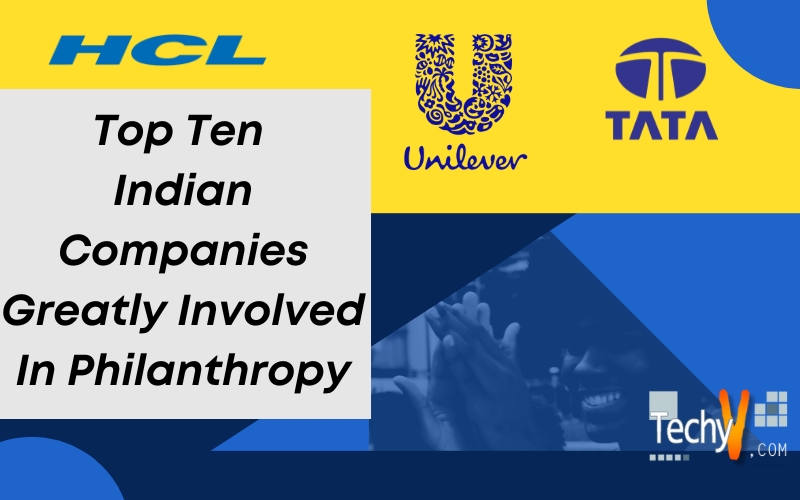Philanthropy is vital in most nations, supporting many private activities and projects that benefit the public good. These businesses not only contributed to the country’s economic progress but also played an essential role in assisting those still in need.
1. Tata Group
The Tatas have continued to donate a large portion of their income to the several trusts they have established for the better welfare of India and its people. Tata trusts control 66 percent of Tata Sons, and the profits from this asset is distributed to various charities, organizations, and individuals.

2. Aditya Birla Group
Aditya Birla Community Initiatives and Rural Development Centre implemented the Aditya Birla group projects, which Rajashree Birla manages. The center carries out many social activities, including formal and non-formal education, adult education, scholarships for girls, merit and technical education for boys and girls, integrated agriculture development, and many others.

3. ITC
ITC’s Agri-Business Division is one of India’s leading exporters of agricultural goods. It sees e-Choupal as a more well-organized supply chain targeted at providing value to its clients worldwide on a long-term basis. ITC expressly created the e-Choupal replica to meet the challenges raised by the particular characteristics of Indian agriculture, such as remote farms, insufficient infrastructure, and the participation of several intermediaries, among other things.

4. Infosys
The Infosys Foundation offers a helping hand in distant areas of India to realize society’s dream. The organization collaborates with numerous non-governmental organizations (NGOs) to assist the poor in earning a sustainable living. Among the notable works of the Infosys Foundation is the construction of 2,541 homes for flood victims in Belgaum, Gulbarga, and other districts; the establishment of an Infosys Super-specialty Hospital on the premises of Sassoon Hospital in Pune; and the requirement of more than 10,150 libraries in rural government schools with a minimum of 200 books depending on the size of the school. Infosys gave 2,567 computers to various Indian schools, universities, and educational institutions. Microsoft Corporation contributes to this project as well by offering essential software.

5. Wipro
The Azim Premji Foundation was established in 2001 to contribute to education that promotes an equal, compassionate, and sustainable society. Since its founding, the charity has worked with approximately 50,000 public school teachers in eight states. Azim Premji contributed $2.2 billion, or a 12.3% interest in his IT outsourcer Wipro, to his foundation, which will finance different humanitarian and non-profit activities of the Azim Premji Foundation.

6. Reliance
In different ways, reliance industries have contributed to the community in the fields of health, education, and infrastructure development. Reliance Industries has established several Population Medical Centres near most production sites to provide complete health services to the community and adjacent communities. The Reliance Dhirubhai Ambani Protsaham Scheme, introduced in 2008-09, continues to help deserving students from low-income families.

7. HUL
Following the terrible earthquake in 2001, HUL rebuilt a village in Gujarat’s Kachchh district, assisting with the construction of a school and a health center; all facilities are earthquake and cyclone-resistant, with an underground reservoir and an above-ground tank for water. The corporation has provided ten crores for the relief and rehabilitation of tsunami-affected households in relief materials, land, and facility development.

8. SBI
SBI Youth for India (SBI YFI) is an Indian rural fellowship program founded, funded, and operated by the State Bank of India (SBI) in collaboration with a few reputable non-governmental organizations (NGOs). It provides a framework for India’s brilliant young minds to join forces with rural people, empathize with their challenges, and connect with their dreams. The selected fellows collaborate with experienced NGOs on critical development projects.

9. Vedanta
Anil Agarwal, founder and chairman of Vedanta, and his family donated Rs. 215 crores and 75% of his fortune to charity in September 2014. The foundation works to improve education and computer literacy, vocational training, women’s and children’s empowerment, and community welfare.

10. HCL
Shiv Nadar, the founder and chairman of HCL Technologies, credits his success to the education and scholarships he received as a child. As of 2019, Nadar had contributed over $800 million through the foundation, directly affecting over 30,000 students. Kiran Nadar, Nadar’s wife, is the chairperson of the Kiran Nadar Museum of Art, India’s first private charitable art museum dedicated to showcasing modern and contemporary works from India and the subcontinent.

Conclusion
The growing number of multinational corporations in the country has given many poor men and women hope for a better future. These businesses not only contributed to the country’s economic progress but also played an essential role in assisting those still in need. Read on to learn about the ten most reputable Indian corporations that have lived up to their social responsibility duty.


















